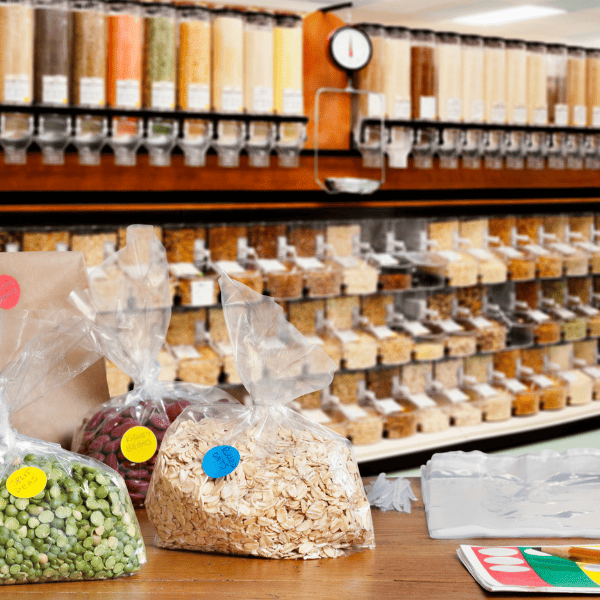Is Buying in Bulk Worth It?
This post may contain affiliate links which might earn us money. Please read my Disclosure and Privacy policies hereIs buying in bulk worth it? It's a question that many of us have pondered while standing in the aisle of a warehouse club, staring at a towering stack of toilet paper or a gargantuan bag of rice.
The potential savings can be enticing, but are they really worth it?
In this post, we'll delve into the pros and cons of bulk buying, examining factors like cost, storage, and waste to help you make an informed decision about whether buying in bulk is the right move for you.
Buying in bulk refers to the practice of purchasing goods or products in large quantities at a discounted price. The concept revolves around the idea that buying in larger quantities can lead to cost savings and convenience.
Bulk buying is commonly associated with grocery items, household supplies, and personal care products, but it can also apply to other goods such as electronics, clothing, and office supplies.
You might enjoy these posts:
- What Is The Best Place To Buy Bulk Food Online
- How to Save Money on Household Essentials
- What Is The Cheapest Food To Buy In Bulk

Pros and cons of buying in bulk
There are several pros and cons to consider when deciding whether buying in bulk is worth it:
Pros:
- Cost savings: One of the main benefits of buying in bulk is the potential for significant cost savings. Purchasing items in larger quantities often results in a lower price per unit, allowing consumers to save money in the long run.
- Convenience: Buying in bulk can help reduce the frequency of shopping trips and the need to restock frequently. This can be especially beneficial for busy individuals or families.
- Reduced packaging waste: Buying in larger quantities can help reduce packaging waste, as it often involves less individual packaging compared to buying smaller quantities.
- Availability: Certain items may only be available in bulk or may be more cost-effective to buy in bulk, making it a practical option for those who regularly use or consume those items.
Cons:
- Storage limitations: Buying in bulk requires adequate storage space, which may be a challenge for individuals with limited storage capacity.
- Risk of waste: Purchasing items in large quantities may lead to waste if the products are not used before they expire or go bad.
- Lack of variety: Buying in bulk may limit the variety of products available, as bulk options are often limited to a few specific brands or sizes.
- Potential for impulse buying: The lower prices associated with bulk buying may tempt some individuals to purchase more than they need, leading to unnecessary spending.
Considering these pros and cons can help individuals decide whether buying in bulk is a suitable option for their needs and preferences. It is important to assess factors such as budget, storage space, and consumption habits before committing to bulk purchases.
Exploring potential cost savings when buying in bulk
Buying in bulk can potentially save you a significant amount of money in the long run. Here's why:
1. Lower unit cost: When you buy in bulk, the cost per unit is usually much cheaper compared to purchasing individual items. This is because suppliers offer discounts and lower prices for larger quantities.
2. Reduced packaging costs: Bulk products often come in larger quantities and have less packaging material, which can help reduce packaging costs. By reducing packaging, manufacturers can pass on the savings to the consumers.
3. Less frequent shopping trips: Buying in bulk means you will have a larger supply of the product, reducing the need for frequent trips to the store. This can save you time, transportation costs, and even the temptation of impulse buying.
Comparison of prices for bulk purchases vs. individual items
To give you an idea of the potential cost savings when buying in bulk, here's a quick comparison:
| Item | Bulk Price (per unit) | Individual Price (per unit) | Savings Percentage |
|---|---|---|---|
| Toilet Paper | $0.50 | $0.75 | 33% |
| Rice | $1.00 | $1.25 | 20% |
| Laundry Detergent | $5.00 | $6.00 | 17% |
| Sugar | $2.00 | $2.50 | 20% |
As you can see from the comparison table, buying in bulk can lead to significant savings on various products. However, it's important to consider your usage and storage capabilities before making bulk purchases to ensure you can fully utilize the products and avoid wastage.
Overall, buying in bulk can be worth it if you have the storage space, regularly use the product, and can take advantage of the cost savings. It's always a good idea to compare prices, calculate potential savings, and consider your specific needs before committing to bulk purchases.
Shelf Life and Storage
Considerations for the shelf life of bulk items
When buying in bulk, it's essential to consider the shelf life of the items you are purchasing. Here are some key considerations:
1. Perishable Items: Perishable items like fresh produce, dairy products, and meats may have a shorter shelf life compared to non-perishable items. It's important to assess how quickly you can consume these items before they go bad.
2. Expiration Dates: Check the expiration dates on the packaging of the bulk items. Ensure that you can use or consume the products before they expire.
3. Storage Conditions: Different products may require specific storage conditions to maintain their freshness and quality. Some items, like canned goods and dry pantry staples, have a longer shelf life and are easier to store, while others, like frozen goods, require adequate freezer space.
Tips for proper storage of bulk purchases
To make the most out of your bulk purchases and ensure they stay fresh for an extended period, follow these storage tips:
1. Invest in Proper Storage Containers: Use airtight containers or resealable bags to store bulk items. This helps to maintain freshness and protect against moisture and pests.
2. Create an Organized System: Keep track of your bulk purchases by organizing them in a designated area. Label containers with the purchase date and item description for easy identification.
3. Rotate your Stock: Practice the “first in, first out” method by using older items before newer ones. This prevents items from expiring or going to waste.
4. Utilize Freezer Space: If you purchase bulk items that can be frozen, such as meats or bread, portion them into smaller sizes and store them in the freezer. This extends their shelf life and allows you to use them as needed.
5. Store in a Cool, Dry Place: Keep non-perishable bulk items in a cool, dry area away from direct sunlight. This helps to maintain their quality and prevent spoilage.
By considering the shelf life of bulk items and implementing proper storage techniques, you can maximize the value of your purchases and minimize waste.
Environmental Impact
Examining the environmental impact of bulk buying
When considering whether buying in bulk is worth it, it's essential to examine the environmental impact of this practice. Here are a few key points to consider:
- Reduction in Packaging Waste: One of the primary benefits of buying in bulk is the reduction in packaging waste. When purchasing items in larger quantities, there is less need for individual packaging, which can significantly reduce the amount of waste generated.
- Less Energy Consumption: Buying in bulk also helps to reduce energy consumption. Purchasing larger quantities means fewer trips to the store are needed, resulting in less transportation and energy usage.
- Lower Carbon Footprint: When products are bought in bulk, it reduces the number of times it needs to be transported, leading to a lower carbon footprint. It reduces the emissions associated with transportation, which benefits the environment.
Comparison of packaging waste for bulk purchases vs. individual packaging
To better understand the environmental impact of buying in bulk, comparing the packaging waste generated by bulk purchases versus individual packaging is essential. Here is a quick comparison:
Bulk Purchases:
- Products are often packaged in larger containers or bags, resulting in less overall packaging waste.
- Reduced need for individual packaging, such as plastic wraps or single-use containers.
- The packaging used for bulk purchases is often more durable and can be reused or repurposed.
Individual Packaging:
- Each product is individually packaged, resulting in more packaging waste.
- Single-use packaging often contributes to the growing issue of plastic pollution.
- Individual packaging may require additional resources for production and disposal.
Buying in bulk has a positive impact on reducing packaging waste and minimizing environmental damage. Consumers can make informed choices that align with their sustainability goals by considering the environmental benefits.
Food Waste Reduction
Potential for reducing food waste through bulk buying
Buying in bulk has the potential to reduce food waste significantly. Here's how bulk buying can help in this aspect:
- Reduced packaging: When purchasing items in bulk, there is less packaging waste compared to individually packaged items. This helps to reduce the amount of plastic and cardboard that ends up in landfills.
- Better portion control: Buying in bulk allows you to purchase the exact amount of food you need, reducing the chances of buying more than you can consume. This can help prevent food from going to waste.
- Extended shelf life: Certain food items, such as grains, beans, and dried fruits, have a longer shelf life when stored in bulk. This allows you to use them over an extended period without worrying about them spoiling quickly.
- Encourages meal planning: When you buy in bulk, you are more likely to plan your meals in advance. This helps to ensure that you use all the ingredients you have purchased, minimizing food waste.
Tips for meal planning and utilizing bulk purchases
To make the most out of your bulk purchases and reduce food waste, here are some helpful tips:
- Plan your meals: Take some time each week to plan your meals in advance. This will help you make a shopping list and ensure that you use all the ingredients you buy.
- Store food properly: Make sure to store your bulk purchases in airtight containers to keep them fresh for longer. This will help preserve the quality and prevent spoilage.
- Label and rotate: When storing bulk items, label them with the purchase date and rotate older items to the front. This will remind you to use them before they expire.
- Get creative: Use your bulk ingredients in different recipes to add variety to your meals. Experiment with new flavors and combinations to make the most out of your purchases.
- Consider sharing: If you have bought more than you can consume, consider sharing the extra food with friends, family, or local food banks. This way, you can prevent it from going to waste.
By following these tips, you can maximize your bulk purchases, minimize food waste, and save money in the long run.
Buying Habits and Consumption
Understanding the impact of buying in bulk on consumption habits
Buying in bulk can have both positive and negative impacts on consumption habits. Here are a few things to consider:
1. Cost Savings: One of the main advantages of buying in bulk is the potential for cost savings. When purchasing larger quantities, the unit price is often lower, resulting in long-term savings.
2. Reduced Packaging Waste: Buying in bulk can help reduce packaging waste since larger quantities often come in less packaging compared to individually packaged items.
3. Storage and Shelf Life: Buying in bulk requires adequate storage space, and it's important to consider shelf life when purchasing perishable items. Make sure to plan your purchases accordingly to avoid waste.
On the other hand, there are some potential downsides to buying in bulk:
1. Overconsumption: Buying in bulk can sometimes lead to overconsumption, especially if individuals feel the need to use up the entire quantity purchased quickly.
2. Limited Variety: Buying in bulk often means limited variety, as many bulk items are staples or essentials. This can restrict choices and may not be suitable for individuals with specific dietary or lifestyle preferences.
Tips for mindful buying and avoiding overconsumption
To make the most of buying in bulk while avoiding overconsumption, consider the following tips:
1. Plan Ahead: Before purchasing in bulk, create a list of items you regularly use and will definitely consume within a reasonable time frame.
2. Check Expiration Dates: Be mindful of the shelf life of the products you are buying in bulk to avoid waste.
3. Consider Storage Space: Make sure you have enough storage space to accommodate the bulk purchases. Proper storage can help maintain freshness and prevent spoilage.
4. Portion Control: If buying in bulk leads to overconsumption, consider portioning out items into smaller containers to help control consumption.
5. Share with Others: If you find yourself with excess bulk items, consider sharing them with friends, family, or even donating to a local food bank to avoid waste.
By practicing mindful buying and being conscious of your consumption habits, buying in bulk can be a cost-effective and environmentally friendly choice.
Quality and Freshness
Assessing the quality and freshness of bulk purchases
When considering whether buying in bulk is worth it, one crucial factor to consider is the quality and freshness of the products. Here are some things to assess when purchasing in bulk:
- Expiration Dates: Check the expiration dates of the products to ensure that you will be able to use them before they spoil. This is particularly important for perishable items such as fruits, vegetables, and dairy products.
- Packaging: Inspect the packaging of the products to ensure that they are intact and properly sealed. Damaged packaging can lead to contamination and spoilage.
- Product Appearance: Examine the appearance of the products to check for any signs of damage, mold, or spoilage. Fresh produce should be firm and free from bruises, while packaged goods should not have dents or bulges.
- Taste and Smell: If possible, sample or smell the product to ensure that it is fresh and has the desired flavor. This is especially important for items like spices, coffee beans, and nuts.
Tips for ensuring quality when buying in bulk
To ensure that you are getting the best quality products when buying in bulk, consider the following tips:
- Shop at reputable stores: Choose stores that have a reputation for high-quality products and prioritize freshness.
- Inspect the products: Take the time to visually inspect the products before purchasing. If something seems off, don't hesitate to ask a store employee for assistance.
- Buy from trusted brands: Stick to brands that you trust and have had positive experiences with in the past. This can help ensure consistent quality.
- Pay attention to storage conditions: Proper storage is crucial for maintaining the freshness of bulk purchases. Make sure to store products in appropriate conditions, such as cool and dry environments.
- Consider your consumption rate: Before buying in bulk, assess your consumption rate and whether you will be able to use the products before they expire. It may be more cost-effective to buy smaller quantities if you are unable to use items quickly.
By carefully assessing the quality and freshness of bulk purchases and following these tips, you can make informed decisions and ensure that buying in bulk is worth it for you.

Convenience and Accessibility
Exploring the convenience and accessibility aspects of bulk buying
When considering whether buying in bulk is worth it, convenience and accessibility are important factors to consider. Here are some points to consider:
- Time-saving: Buying in bulk can save you time by reducing the frequency of shopping trips. Instead of making multiple trips to the store, you can stock up on essential items and reduce the time spent on shopping.
- Costco and other warehouse stores: Warehouse stores like Costco offer a wide range of bulk items at discounted prices. These stores often have a large selection of products, making finding everything you need in one place convenient.
- Online shopping: Many retailers offer bulk buying options online, allowing you to conveniently purchase items in large quantities from the comfort of your home. This can be especially useful for those with limited access to physical stores or for those who prefer the convenience of online shopping.
- Storage and organization: Buying in bulk requires adequate storage space to accommodate the larger quantities of items. It's important to consider whether you have enough space to store bulk purchases and how you can effectively organize and manage your inventory.
- Expiration dates: When buying in bulk, paying attention to expiration dates is important to ensure that you can use the products before they go bad. Properly storing and rotating your stock can help minimize waste.
Comparison of bulk buying options in different locations and scenarios
The convenience and accessibility of bulk buying can vary depending on location and individual circumstances. Here are some scenarios to consider:
- Families or individuals: Bulk buying can be particularly convenient for larger families or individuals who consume common household items frequently. It allows them to save money and reduce the frequency of shopping trips.
- Businesses and organizations: Buying in bulk is often essential for businesses and organizations that require a continuous supply of products. They can take advantage of bulk discounts and ensure they have enough inventory to meet their needs.
- Limited storage space: For those with limited storage space, bulk buying may not be feasible. It's important to consider whether you have enough space to store bulk purchases without cluttering your living or working environment.
- Frequent travelers or those with mobility issues: For individuals who travel frequently or have mobility issues, online bulk shopping can provide a convenient solution. It eliminates the need to physically visit stores and allows products to be delivered directly to their doorstep.
The convenience and accessibility of bulk buying can be highly beneficial in certain situations. It can save time, provide access to discounted prices, and ensure a continuous supply of essential items. However, it's important to consider factors such as available storage space and individual needs before deciding if buying in bulk is worth it.
After considering the pros and cons of buying in bulk and the key considerations involved, it is clear that the decision ultimately depends on individual circumstances and preferences. Here are some key takeaways to keep in mind:
Weighing the pros and cons of buying in bulk
- Pros:
- Potential savings on cost per unit.
- Convenience of having a stockpile of essential items.
- Reduces the frequency of shopping trips.
- Cons:
- Upfront cost can be significant.
- Limited storage space may be a constraint.
- Risk of waste if products expire or go unused.
Key considerations before deciding to buy in bulk
- Evaluate the product's shelf life and consider if it can be consumed or used before expiration.
- Assess your available storage space to ensure you have enough room to store bulk purchases.
- Compare prices per unit to determine if buying in bulk offers significant savings.
- Analyze your consumption patterns to determine if you will benefit from purchasing larger quantities.
Ultimately, analyzing your specific needs, budget, and storage capabilities is essential before deciding whether buying in bulk is worth it for you.








These are all great things to think about when headed to Costco to buy your groceries. Thanks for sharing. I would like to invite you to link up with us at Family Joy Blog Link Party. Sunday-Wednesday. Check us out http://thinking-outside-the-pot.com/?p=2808